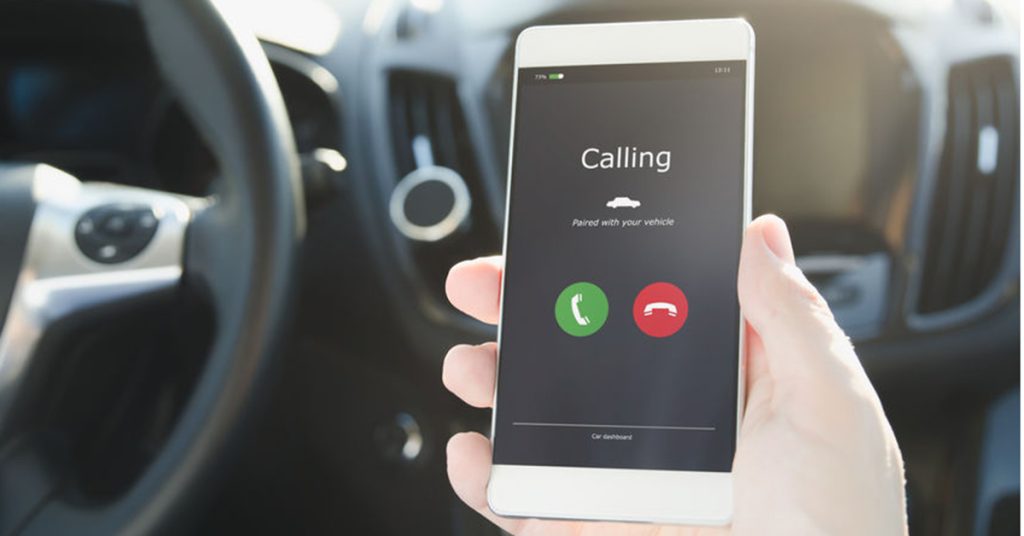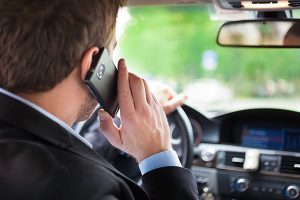Posts Tagged ‘“distracted driving”’
Massachusetts Hands-Free Law Update: Fines Can Begin April 1, 2020
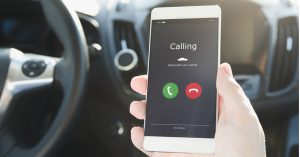
The Massachusetts hands-free driving law bans this action. Fines start today, April 1, 2020.
As of today April 1, Massachusetts police departments can start to issue citations and fines to drivers who violate the Massachusetts hands-free driving law. We encourage you to follow the Massachusetts COVID-19 “Stay at Home” advisory. But if you have to go out, you can help yourself drive more safely and avoid a fine by checking that your car is set up for hands-free mode. Even better? Read this update, but turn off your cell phone while driving. Many of us are exhausted and out-of-routine. Focus on the roads and what you need to get done, so you can get back home.
So far, many drivers are still picking up phones, despite the new law. During the initial grace period from Feb. 23-Mar. 31, police issued 4,500 written warnings across Massachusetts, according to a state official interviewed by WGBH. The official said drivers must become aware of both the law and that police are watching.
“…the police officers I’ve talked to seem to say that everyone who is pulled over says, “Yes, I’ve heard about it. Sorry. My mistake,” said Jeff Larason, director of highway safety at the Massachusetts Executive Office of Public Safety. (Listen to the WGBH segment in full).
Massachusetts passed a texting while driving law in 2010 but lawmakers spent nearly 10 years debating the handheld cell phone ban.
The Massachusetts hands-free driving law was passed by the Massachusetts Legislature in November 2019 and quickly signed by Gov. Charlie Baker on Nov. 29. To help drivers get ready, the state granted an initial grace period. Larason told WGBH 4,500 drivers had received written warnings (broadcast date: March 13). The Boston Globe reported State Police had issued 578 warnings to drivers, in just the first week. On Cape Cod, local police reported 150 verbal or written warnings in the first week (Source: South Coast Today via Cape Cod Times).
What the law allows and bans:
- The law states drivers cannot use any electronic device, including mobile telephones, unless the device is being operated in hands-free mode.
- Drivers can only touch cell phones and mobile phones once to activate hands-free mode.
- Cell phones must be properly mounted to the windshield, dashboard or center console and not impede with operation. This is the only way drivers are allowed to use GPS or voice to text technology such as Bluetooth.
- Drivers are specifically not allowed to touch phones for texting and emailing. Use of apps, video or Internet is also prohibited.
- Drivers who are 18 and younger are not allowed to use cell phones behind the wheel. Hands-free is illegal and can result in violation of their Massachusetts Junior Operator’s License.
- You may be stopped. But you are not allowed to pick up your phone at red lights or stop lights.
- You can pick up your cell phone and make a call if you are in a stationary position, outside a travel lane or bicycle lane.
- There is also an exemption for emergency professionals who need to pick up the phone for calls and those calling 911. 911 calls must be taken seriously. The state advises drivers to make every attempt to pull over before calling 911 – even if you are in hands-free mode.
Violations of the Massachusetts Hands-Free Driving Law
Police in Massachusetts can now start issuing tickets. Here are the penalties:First offense: $100 fine.
Second offense: $250 fine and distracted driving education.
Third offense: $500 fine and distracted driving education.
With a third offense, you may face an insurance surcharge.
Related:
Massachusetts hands-free driving law, Mass.gov
Breakstone, White & Gluck – Boston Personal Injury Lawyers: 800-379-1244
With more than 100 years combined experience, Breakstone, White & Gluck specializes in representing plaintiffs in personal injury cases involving car accidents, truck accidents, pedestrian accidents and bicycle accidents. Our attorneys have extensive experience handling cases for clients injured by negligent use of cell phones and texting while driving. We represent clients across the state of Massachusetts in car accident cases, including in Boston, the North Shore, the South Shore and Cape Cod.
We are open and working remotely for our clients during the state’s COVID-19 advisories. If you have been injured, we are providing free legal consultations at 800-379-1244 or 617-723-7676. You can also use our contact form.
Study Says Americans Are Checking Smart Phones Every 12 Minutes

Americans are checking their cell phones every 12 minutes, according to new research. This means more distraction, including in the car.
As we wait out this snowstorm, you may be checking your smart phone more than usual. This is understandable. But how often do you check on an average weekday? One report shows Americans are checking their smart phones every 12 minutes or 80 times a day. And between Facebook, Twitter and e-mail, we all know someone who may check even more often.
Use your smart phones as often as you want – except in the car. Please consider these thoughts as you wait out the snow:
Can I receive a ticket for using my cell phone in the car in Massachusetts?
In 15 states, drivers are banned from all cell phone use in the car. In Massachusetts and 46 other states, drivers are banned from texting while driving. Massachusetts has banned texting while driving since September 30, 2010, when the Safe Driving Law took effect. However, talking on a handheld cell phone is legal in Massachusetts, even though any cell phone use can be distracting and cause a car accident.
Drivers can receive a ticket if they are stopped for texting while driving. The ticket comes with a fine of $100 for the first offense, $250 for the second offense and $500 for a third or subsequent offense. Junior operators – drivers who are 16 1/2 to 18 years old – are not allowed to use cell phones at all and face more severe penalties, starting with a 60-day license suspension, a $100 fine and attitudinal retraining for the first offense.
For the second offense, teens can lose their license for 180 days and have to pay a $250 fine. For the 3rd of subsequent offense, they lose their license for a year and have to pay a $500 fine.
How often are people using smart phones?
Very often. Asurion, a global tech company, reported on smart phone user habits last November. The company surveyed 2,000 users and found they reached for their phones on average every 12 minutes or 80 times a day. One in 10 people checked their phone every four minutes. In addition, 31 percent of survey participants had separation anxiety when away from their phones. The longest any participant was prepared to go without their phone? Four hours (that one sounds fairly reasonable to us, if you are not driving).
Participants also prioritized their smart phone over sweets. Some 62 percent said they would rather lose chocolate for a week than their cell phone for a day.
How often are people using cell phones in the car?
Zendrive, a driving analytics company, conducted a three-month analysis of three million drivers. The company reported drivers used cell phones on 88 percent of the trips analyzed. On average, drivers spend 3.5 minutes on the phone per one hour trip.
How can I stop my teenager from texting while driving?
Your teenagers may use their cell phones more often than anyone else in your house. You may want to encourage your teenager to take breaks from their smart phone so it doesn’t have such a strong hold.
You can also make your teen earn their driving privileges. Gradually build up to allowing them to drive with friends or go further than school so they understand that it is a responsibility. You can also explain the law. In Massachusetts, junior operators – drivers between 16 ½ and 18 years old – face harsher penalties for cell phone use and texting. As we mentioned above, they can lose their license on the first offense.
Then, you can share safety resources and tell them you want to save them from the life-changing experience of injuring someone or causing themselves harm. AT&T has its It Can Wait campaign, which shows stories from drivers who made the mistake and the victims who suffered the very serious consequences.
Finally, you can set a good example for your teenager. Always put your cell phone in your bag in the backseat when you are driving with them.
The good news about cell phones is you can turn them off and everyone in your family will be safer. Here are a few tips for when you step back outside after the storm:
- Turn your cell phone off while driving.
- Limit use of Bluetooth devices and infotainment systems. They are legal, but they can still be distracting.
- Take a few apps off your cell phone so you have fewer reasons to reach for your phone.
- If you play games on your cell phone, consider installing them on a different device if you have one. Play them at home.
- Do not be a distracted passenger. Make light conversation or carry a magazine if you are traveling far.
- Ask your family members to put the phone away too.
- Map out your directions before you get in the car. If you are busy, ask your teenager to help you.
- If you must check your cell phone, pull over in a safe place to check your phone. Choose a place where you can safely park and turn off your engine.
- Do not reach for your cell phone or glance at it at traffic lights or intersections.
- Finally, choose your times to engage in social media. Do not actively engage before you start commuting home. Instead, come up with a time each day (or a few times a day) when you can safely respond or chat with social media friends or check e-mail.
About Breakstone, White & Gluck
The Boston car accident lawyers at Breakstone, White & Gluck have over 100 years combined experience representing those who have been injured in motor vehicle crashes in Massachusetts. If you have been injured, learn your legal rights. For a free legal consultation, contact our attorneys at 800-379-1244 or 617-723-7676 or use our contact form.
Will Massachusetts Pass a Handheld Cell Phone Ban for Drivers?
As attorneys, we have represented hundreds of victims of motor vehicle crashes over the past three decades. In recent years, we have seen texting while driving and cell phone use by drivers multiply at an alarming rate, causing a stunning number of injuries and deaths. These injuries are preventable, but each year, drivers continue to reach for their phones and the toll rises.
According to the US Department of Transportation, cell phones are now involved in 1.6 million auto crashes each year, injuring 500,000 people and causing 6,000 deaths. While many states have already passed legislation to reduce distracted driving accidents, some are now considering additional measures, including Massachusetts.
Massachusetts lawmakers passed the Safe Driving Law in 2010, which banned texting while driving. There was no further action until January 2016, when the Massachusetts state Senate passed a bill banning handheld cell phone use. The ban would have allowed drivers to use hands free technology to dial and talk. According to the State House News Service, the Massachusetts House of Representatives gave initial approval to a similar bill but the legislation stalled.
With Governor’s Comments, Handheld Cell Phone Debate Returns to the News
 There was no update for several months. Then Governor Charlie Baker spoke in February, indicating he may not support a handheld ban.
There was no update for several months. Then Governor Charlie Baker spoke in February, indicating he may not support a handheld ban.
“I don’t want to get out of the business of making it possible for people to talk to other people when they’re driving. Because I think the texting thing is a big problem. I’m not sure I believe that the talking thing is,” Baker said during his “Ask the Governor” segment on WGBH Thursday. His comments were published by the State House News Service.
When the show’s co-host noted that drivers could use hands-free Bluetooth devices, Baker said:
“So now we’re just going to let people who can afford to put a Bluetooth in their new car to have the ability to talk when they’re in a car?” Baker responded. “But we’re not going to let anybody else? Hmm. Let me think about that one a little.”
Following the interview, The Boston Herald called on state lawmakers to resume their work to ban handheld cell phones: “Drivers in Massachusetts have proven that when it comes to using their phones behind the wheel they’re incapable of regulating themselves.”
When texting while driving was banned in 2010, texting was the major concern for distracted driving, the Herald wrote. Today, more people have smartphones which offer quick access to social media and other apps.
How Widespread is Texting While Driving in Massachusetts?
Critics say enforcement for Massachusetts’ texting while driving ban is challenging when drivers can hold their phones to talk, but not for other purposes. Police have worked through some of these issues. According to a Boston Globe analysis, Massachusetts police officers wrote 6,131 tickets in 2015, compared to 1,153 in 2011, the first year of the ban. Overall, between late 2010 and mid-April of 2016 when the analysis was published, 18,383 tickets were issued for texting while driving in Massachusetts.Drivers under 40 years old received the most tickets and many drivers got caught during Distracted Driving Awareness Month, when many local police departments receive safety grants for enforcement.
Where Proposed Legislation Now Stands in Massachusetts
Massachusetts is one of 46 states which have texting while driving laws. Just 14 states also ban handheld cell phone use, according to the National Conference of State Legislatures. New Hampshire, Vermont and Connecticut are among the early adopters.
Expect to hear more debate about a handheld cell phone ban in Massachusetts at some point in the future. While Governor Baker has voiced reservations, when the 2017-2018 legislative session began in January, the Massachusetts House of Representatives referred legislation for hands-free cell phone devices to the Legislature’s Joint Committee on Transportation.
Where to Find Distracted Driving Safety Campaigns and Information
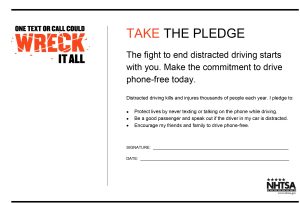
Safety campaigns are critical to preventing distracted driving accidents. There are many out there, offering programs for schools and information online. One effort is from the Massachusetts Academy of Trial Attorneys (MATA), which brings its “End Distracted Driving” program to high schools. We support this campaign. Two of our partners, Marc L. Breakstone and Ronald E. Gluck, serve on the MATA Board of Governors. Partner David W. White is a long-time member.
Another effort comes from the National Highway Traffic Safety Administration (NHTSA), which offers this pledge which family members can sign to promise each other they will not use a cell phone while driving.
Distracted Driving Prevention and Safety Campaigns:
Distraction.gov: Official U.S. website for distracted driving.
It Can Wait!: AT&T’s documentary to stop distracted driving.
Distracted Driving Lessons in Massachusetts
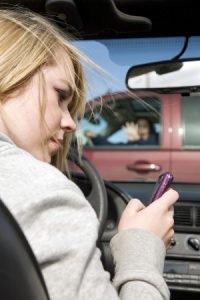 This month, students at four high schools in Massachusetts will sit down at computer simulators and learn what it feels like to text or use a cell phone while driving and then crash.
This month, students at four high schools in Massachusetts will sit down at computer simulators and learn what it feels like to text or use a cell phone while driving and then crash.
This is part of Arbella Insurance Foundation’s Distractology 101 program, which will visit Braintree High School, Phillips Academy in Andover, Falmouth High School and Sacred Heart High School in Kingston. Although the young drivers will not actually suffer or cause injury, or feel the remorse of having caused the collision, they will be taught the lesson that distracted driving behaviors, such as cell phone use, using a GPS and even eating and drinking, can result in car accidents and serious injuries. These behaviors should be considered as or more dangerous than speeding or running a red light.
Consider these statistics from the National Highway Traffic Safety Administration (NHTSA):
- 10 percent of all fatal crashes in 2011 were reported as distraction-affected crashes (3,331 people killed).
- Among those who were killed, 12 percent died in a car crash which involved cell phone use.
- Some 17 percent of all injury crashes in 2011 were reported as distracted-affected crashes (or 387,000 people injured).
- Among those who were injured, 5 percent were injured in a car accident which involved cell phone use.
Laws have been implemented to reduce the dangers caused by distracted driving. While no state bans all drivers from all cell phone use, hand-held cell phone use is not permitted in 15 states, including Vermont as of Oct. 1.
Laws related to texting while driving are much more prevalent. Texting while driving is now against the law in 44 states. Washington passed the first ban in 2007. Massachusetts implemented its law four years ago. The law, St. 2010, c. 155, bans texting by drivers, including reading, writing or sending messages. Drivers cannot text while driving or sitting at red lights, intersections or other public ways. This is a primary offense, meaning police can pull drivers over when they suspect the behavior, even without any other cause.
Despite these laws, drivers here and in other states still text and check their social media accounts. Younger drivers under 25 are two to three times more likely to text or e-mail while driving than others, according to the NHTSA. But these violations are not limited to young drivers, as the evidence is that older drivers are also engaging in this prohibited behavior.
Fortunately there is some evidence that these laws are starting to work. Recently The Journal of American Health reported that traffic fatalities had dropped 3 percent in states which have primary enforcement laws like Massachusetts. States that ban younger drivers from texting while driving saw an 11 percent drop. The journal studied national traffic data over 11 years.
States may continue to pass laws to reduce distracted driving, but drivers carry responsibility for putting down the phone and becoming aware of other distracting behaviors, such as eating and drinking, talking to passengers, grooming, reading maps, using a GPS, watching a video or adjusting a radio or music player.
There are some good safety resources out there to help families understand the problem and the attitudes and behaviors that contribute to it. We encourage you to take a look and share them with your colleagues at work and with your family, friends, and children.
For More Information
About Breakstone, White & Gluck
The Boston motor vehicle accident lawyers at Breakstone, White & Gluck have over 100 years combined experience representing clients seriously injured in car accidents. If you have been injured, it is important to learn your rights. For a free legal consultation, contact us at 800-379-1244 or 617-723-7676 or use our contact form.


